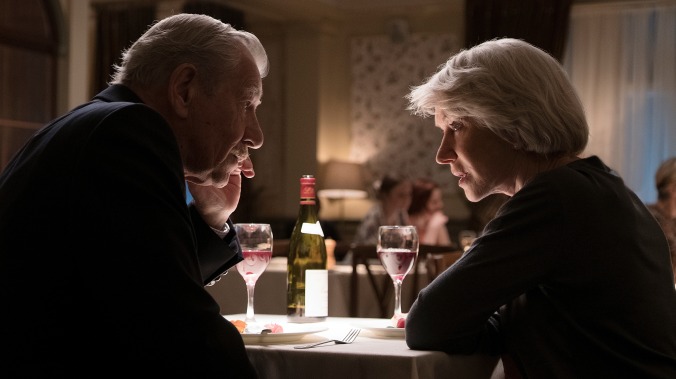This mutual confession flies an immediate warning flag that one or both of these charming, adorable, lonely folks might not be trustworthy. Quickly enough, the balance of dishonesty tips to McKellen’s Roy, who purports to head home on the London tube following his date, and instead jumps into a cab and hightails it to a strip club, where he’s clearly brokering some shady investments for a group of anonymous middle-aged men. Mirren’s Betty, meanwhile, does exactly what she says she’ll do, and hops into a car driven by her dutiful grandson Steven (Russell Tovey).
By exposing Roy’s deception so quickly, director Bill Condon may be simply following the novel from which his film has been adapted. But it also feels like an admission that The Good Liar is not going to deal in cracking suspense; that would require a taut ruthlessness that hasn’t been evident in Condon’s previous films, even when he’s directing game-raising actors like McKellen (who he’s worked with repeatedly) or Mirren. It’s disappointing, though probably also realistic, to find out that Roy’s scams are high-toned and moderately convincing but not exactly slick. He specializes in bilking investors with phony schemes, adding a side of violence as necessary. It’s a perfect fit for his cover as a kindly, banal old fellow given to old-timey expressions and amorphisms (“tickety-boo”)—which in turn is perfect for the precisely cured hamminess that McKellen can play under the right underwritten circumstances.
It becomes clear early in The Good Liar that another shoe, possibly several shoes, will have to drop at some point, and for a time, Condon’s film is an entertaining exercise in well-acted pleasure-delaying. Roy, affecting a bum knee, becomes a harmless-seeming companion to Betty, who invites him into her stairs-free suburban home, awash in beige and dotted with blandly tasteful furniture. Roy works up to his fairly unimpressive scheme to gain access to Betty’s nest egg, and Steven, who is immediately skeptical of this interloper, quickly becomes irritated with his insinuating folksiness. As McKellen pretends to dodder, Mirren expertly walks the line between trusting and savvy.
To describe much further would risk giving the game away, which would be a shame not because The Good Liar contains a diabolical, surprising, or even particularly compelling twist, but because its arbitrary backstory is all it has. After successfully holding back key information for about half its running time, the movie lets absurd World War II melodrama overtake its con-artist story, with exposition-dropping monologues accompanying flashback scenes that are, at least, shot with a different texture (handheld, more saturated colors) than the intentionally sterile contemporary scenes.
The Good Liar flirts with the puncturing of Greatest Generation mythologies, but fails to say anything meaningful about what World War II meant to either of these characters beyond the grinding machinations of their overplotted lives. In place of genuine provocation or suspense, the story prompts utilitarian questions about when the movie is taking place (sometime after 2000 and the advent of cell phones, but not recently enough for the characters to be nonagenarians) and whether certain earlier scenes make sense in light of the eventual revelations (generally: sort of). Instead of deepening his material, Condon has made an unsuccessful fling of a movie: fun for a while, but trying to get as far as it can by leaving crucial material off of its profile.


 Keep scrolling for more great stories.
Keep scrolling for more great stories.
